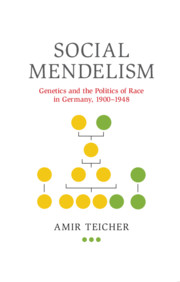Crossref Citations
This Book has been
cited by the following publications. This list is generated based on data provided by Crossref.
Teslow, Tracy
2020.
Handbook of the Historiography of Biology.
Vol. 1,
Issue. ,
p.
1.
Radick, Gregory
2020.
Making sense of Mendelian genes.
Interdisciplinary Science Reviews,
Vol. 45,
Issue. 3,
p.
299.
Teslow, Tracy
2021.
Handbook of the Historiography of Biology.
p.
343.
Kendler, Kenneth S.
2021.
Ernst Rüdin's, 1911 vision of a Mendelian psychiatric genetics research program: His paper “Methods and goals of family research in psychiatry”.
American Journal of Medical Genetics Part B: Neuropsychiatric Genetics,
Vol. 186,
Issue. 5,
p.
279.
Bejan, Raluca
2022.
Whiteness in Question: the Anatomy of a Taxonomy Across Transnational Contexts.
Dialectical Anthropology,
Vol. 46,
Issue. 3,
p.
347.
Kendler, Kenneth S
and
Klee, Astrid
2022.
Introduction to “The Beginnings of Systematic Studies of the Genetics of Schizophrenia: 1916–1933”.
Schizophrenia Bulletin,
Vol. 48,
Issue. Supplement_1,
p.
S4.
Kendler, Kenneth S.
2022.
The beginnings of biometrical psychiatric genetics: Studies of the insane diathesis 1905–1909.
American Journal of Medical Genetics Part B: Neuropsychiatric Genetics,
Vol. 189,
Issue. 1-2,
p.
6.
Kendler, Kenneth S.
and
Klee, Astrid
2022.
The place of Franz Kallmann's 1938 “the genetics of schizophrenia” in the history of psychiatric genetics.
American Journal of Medical Genetics Part B: Neuropsychiatric Genetics,
Vol. 189,
Issue. 1-2,
p.
26.
Liscum, Mannie
and
Garcia, Michael L.
2022.
You can't keep a bad idea down: Dark history, death, and potential rebirth of eugenics.
The Anatomical Record,
Vol. 305,
Issue. 4,
p.
902.
Hildebrandt, Sabine
2022.
Books, bones and bodies: The relevance of the history of anatomy in Nazi Germany for medical education today.
The Anatomical Record,
Vol. 305,
Issue. 4,
p.
886.
Lefkaditou, Ageliki
2022.
Blood Affairs: Racial Blood Group Research and Nation Building in Greece, 1920s–1940s.
Perspectives on Science,
Vol. 30,
Issue. 1,
p.
48.
Kendler, Kenneth S
and
Klee, Astrid
2022.
Bruno Schulz and his 1926 Article: “Regarding the Problem of Determining Hereditary Prognosis. The Affliction Prospects for Nephews and Nieces of Schizophrenics”.
Schizophrenia Bulletin,
Vol. 48,
Issue. Supplement_1,
p.
S28.
Pojar, Vojtěch
2022.
Resisting Nazi Racism in Post-Habsburg Spaces: Connecting the Debates in Czechoslovakia, Austria, and Yugoslavia in the Early 1930s.
East Central Europe,
Vol. 49,
Issue. 1,
p.
97.
Maksudyan, Nazan
2023.
Racial anthropology in Turkey and transnational entanglements in the making of scientific knowledge: Seniha Tunakan’s academic trajectory, 1930s–1970s.
History of the Human Sciences,
Vol. 36,
Issue. 2,
p.
154.
Thelen, Tatjana
2024.
What’s in a family?.
HAU: Journal of Ethnographic Theory,
Vol. 14,
Issue. 2,
p.
528.
Pojar, Vojtěch
2024.
A dark coevolution: racial discourses and transnationalism in interwar Czechoslovakia.
European Review of History: Revue européenne d'histoire,
Vol. 31,
Issue. 1,
p.
47.
Marks, Jonathan
2024.
Imagining a world without Mendel. Review of: Disputed inheritance: The battle over Mendel and the future of biology. By GregoryRadick, Chicago: University of Chicago Press. 2023. pp. xii + 630 (paperback). ISBN: 9780226822723 and How we get Mendel wrong, and why it matters. By Kostas Kampourakis, Boca Raton: CRC Press. 2024. pp. xxi + 226 (paperback). ISBN: 978103245690‐4.
American Journal of Biological Anthropology,
Vol. 185,
Issue. 4,
2024.
The German Empire, 1871–1918.
p.
347.
Sommer, Marianne
Arni, Caroline
Müller-Wille, Staffan
and
Teuscher, Simon
2024.
In the shadow of the tree: The diagrammatics of relatedness in genealogy, anthropology, and genetics as epistemic, cultural, and political practice.
History of the Human Sciences,
Vol. 37,
Issue. 3-4,
p.
3.
Teicher, Amir
2024.
How family charts became Mendelian: The changing content of pedigrees and its impact on the consolidation of genetic theory.
History of the Human Sciences,
Vol. 37,
Issue. 3-4,
p.
85.



